Tomsk State University: Physicists have won Basis Foundation grants
Alexey Sharapov, TSU Department of Quantum Field Theory professor and head of the Laboratory of Theoretical and Mathematical Physics of the Faculty of Physics, is one of the ten winners of the Russian competition Leader for 2021. Another grant (Junior Leader) from the same organization was won by Rashid Valiev, assistant professor at the Department of Optics and Spectroscopy at the Faculty of Physics and senior researcher at the Laboratory of Quantum Mechanics of Molecules and Radiation Processes.
The project of Alexey Sharapov’s research group is developing new geometrical methods to solve a number of quantum field theory problems.
“There are two master’s students in our research group, Boris Elfimov and Nikita Gorev, who have studied this topic from the third year of their bachelor’s degree. We’ve already had a co-written article published in ‘Theoretical and Mathematical Physics’ when we applied for the grant. We plan further publications in the next three years,” commented Alexey Sharapov. “It’s nice to note that it is not the first time when our department staff has won the Leader grant. In 2020 it was Simon Lyakhovich, lead researcher at the Laboratory of the Theoretical and Mathematical Physics and head of the Department of Quantum Field Theory.”
Rashid Valiev’s topic of research is theoretical models for studying the photophysical and photochemical characteristics of molecules by quantum chemical methods.
These models will enable calculating luminescence properties of molecules. This information is needed in LED and laser manufacture. Rashid Valiev is the head of the research group, comprising PhD student Renat Nasibulin and master’s student Linara Valiulina.
“I think that a well-made team plays a key role in winning a competition. It means you have enough potential to achieve the set goals and demonstrate preliminary results. And of course, it is important to have high-ranked publications – it is proof of your research work,” noted Rashid Valiev. “We all have articles in Q1 or Q2 journals. Probably the third key factor – although it was not listed in the criteria – is to have other grants or support from foundations or universities. Our group, for example, is supported by the Russian Science Foundation for another project.
For the three years of the grant period, the group intends to publish three articles in high-ranked journals and possibly more.

